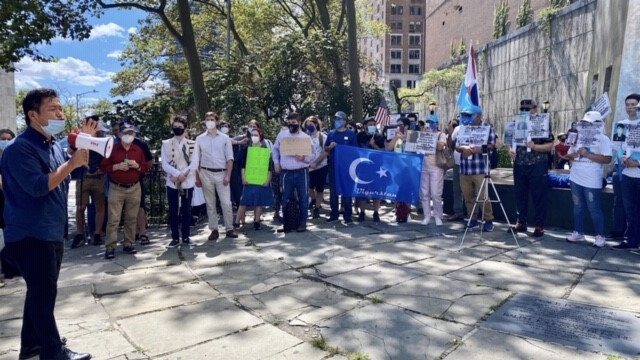On Sunday, August 30th at 1:00 p.m., a group rallying for Uyghur right—led by Queens College junior Alexander “Shabbos” Kestenbaum—positioned itself in front of the Isiah wall directly in front of the United Nations. The group included members of the Jewish community, as well as prominent Rabbis, political refugees of China, and Holocaust survivors, and they all gathered to express their solidarity and support for the Uyghur Muslims currently facing persecution in China.
The Uyghurs, an ethnic Muslim minority that mostly live in northwest China, have faced discrimination from the Chinese Communist Party (CCP) for decades. The situation escalated dramatically in 2014, when the Chinese government, under General Secretary Xi Jinping, announced a “people’s war on terror.” Over the next three years, the CCP constructed some 1,300 “re-education camps,” to which as many as a million Uyghurs and other Muslims were sent and confined for the purpose of being indoctrinated and forced to abide by the Chinese Communist ideology. Over the past year, awareness of the Uyghurs’ situation has been rising rapidly in communities in the United States. This rise in awareness has been evident among both college students and the Jewish community.
“We couldn’t just do nothing,” said Kestenbaum, who is majoring in Jewish Studies and Russian at QC, and an active member of the Jewish community. Kestenbaum’s passion for spiritual activism and his shock upon discovering the conditions the Uyghurs currently face in China ultimately motivated him to organize the rally with the goal of demonstrating Jewish solidarity with the Uyghurs as well as promoting awareness of the situation.
A series of speakers presented at the rally, each discussing a different aspect of the issue. Among them were journalist and spiritual activist Rabbi Hody Nemes, Tibetan refugee and activist Dorjee Tseten, political refugee and Uyghur activist Tahir Imin Uighurian, and motivational speaker and Holocaust survivor Sami Steigmann. Each speaker helped bring awareness of the crisis abroad through a different lens, depending on their personal experiences and expertise. As a result of a great many parallels drawn between the current concentration and indoctrination of Uyghurs and the concentration camps that many Jews were forced into during the Holocaust, many among the Jewish community have been particularly responsive toward the Uyghur situation, and the rally contained mainly members of the Jewish community.
“What’s happening now with the Uyghur Muslim ethnicity in China is not a comparison to the Holocaust, but there are some eerie similarities of having forced labor camps,” Kestenbaum said. “The number one most important issue at this time is awareness. I don’t think enough people really understand what’s going on or know what’s going on. So number one is getting the word out there.”
Kestenbaum has not been the only Jewish voice clamoring for community recognition regarding the religious oppression of Uyghurs in China. On August 3, 2020, Rabbi Avi Shafran, the Director of Public Affairs of Agudath Israel of America, published an article titled “My fellow Orthodox Jews: Start fighting for the Uyghurs”. The article called for the Jewish community to promote awareness of the treatment of Uyghurs in China, stating that “the image of millions of innocent people being concentrated against their will in camps is one that a people characterized by the Talmud as “merciful, modest and charitable” (Yevamot, 79a) cannot ignore.”
True to Shafran’s words, the Chinese Uyghur population has been living in challenging, inhumane conditions during recent years. This issue is both current and alarming, and it is indeed crucial for the details of this situation to be more widespread in order to affect change.
“This is not a Uyghur issue. This is a global issue!” speaker Tahir Iman emphasized at the rally. “If you want to live a member of the free world you should stand up!”
College students certainly have a reputation of “standing up” regarding social inequality, and many, like Alexander, have been searching for ways to promote this issue in order to ensure a safer future for the Uyghurs in China. Those looking for ways for students to get involved in advancing awareness of the Uyghur situation are encouraged to join the Uyghur Human Rights Project’s Uyghur Lobby Days supporting the Uyghur Forced Labor Prevention Act, endorse the global campaign for fashion brands to end complicity with Uyghur forced labor, and reach out to their local political leaders in support of the Uyghur cause.











